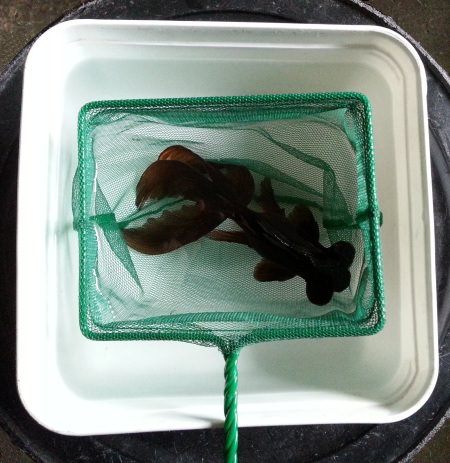| Back to Back Issues Page |
 |
|
The Goldfish Gazette, Issue #058 -- Medicinal Dips October 30, 2018 |
Goldfish Care TipsA Free Monthly Resource For Goldfish Enthusiasts In This Issue
Giving your Goldfish a medicinal dip to cure what ails it is a popular practice often suggested in Goldfish Groups on social media, but is the practice actually effective? Medicinal Dips For clarity, a medicinal dip is when a fish is placed in a very strong solution of medication for a very short period of time usually measured in seconds. The time frame is critical to ensure the fish is not harmed, but the pathogen being targeted is killed. A medicinal bath is when a fish is placed in a far weaker solution over a longer period, which could be weeks depending on water temperature, which either kills the pathogen more slowly or hinders its ability to reproduce. There is no point dipping a fish in a bath strength solution as the medication will be too weak to have an effect. How it WorksAny pathogen is very small compared to a juvenile or adult Goldfish, so its tolerance to an extremely strong medication is far weaker. By dipping a sick fish into a strong solution for a short period of time, the pathogen is killed before the fish is harmed.An example of this is when using salt as a dip. Osmosis occurs when a less salty solution flows into a saltier solution. By dipping a fish with parasites into a very salty solution, the body fluids of the fish and parasites start to flow outwards to the salty solution. Because of its bigger body mass, this movement of fluids doesn’t have time to harm the fish, but as the parasites are very small, they quickly lose much more of their body fluids and literally explode. Many aquarists give their fish a dip expecting that the fish will make an immediate recovery, but then get on social media to ask for advice because the fish doesn’t appear any better. There are various reasons why this could occur;
Advantages and Disadvantages of DipsAdvantages:A dip as a form of treatment is very quick. If a fish is severely infested with parasites, a quick dip could remove most of them within seconds. Large numbers of fish can be treated using small amounts of medication. Disadvantages: It is dangerous if too prolonged or the medication too strong. There isn’t a lot of information available on medication strengths and dip time periods. Many pathogens are too small to see so you are only guessing whether the treatment was effective or not or you have to wait to see if there is an improvement in the patient. Dipping may not kill all the pathogens. Treatment may need multiple dips, so fish can’t be returned to a community tank until a cure is confirmed. Dips don’t work for Ich as the parasites are lodged under the skin. They have limited use for bacterial and fungal treatments as the dip may temporarily remove pathogens from the fish’s skin, but unless the cause of the attack such as wounds are healing, or the fish is placed in sterile water, the fish will quickly be re-infected. Fish that have been given a dip should still be placed in a salt bath for at least a week because most pathogens also cause secondary illnesses. Parasites often cause fungal and bacterial attacks because of the damage they do to the fish’s skin. Commonly Used Dip MedicationsPotassium Permanganate – Used for treating bacterial, fungal and parasitical conditions. Can and often does burn gills and skin, not recommended.Salt – Primarily used for parasite control. Methylene Blue - Primarily used for treating fungus. SummaryMedicinal dips have limited uses, mainly for parasite control. Even when a dip is used, the patient should still be placed in a medicinal bath until all signs of the disease are gone.Medicinal baths are far safer to use than dips for the inexperienced.
To learn more about Goldfish diseases and their treatments click here... Comments? Ideas? Feedback? I'd love to hear from you. Just reply to this e-zine and tell me what you think, or what topics you want covered. Next Month's Topic Mixing varietieswww.facebook.com/aboutgoldfish |
| Back to Back Issues Page |